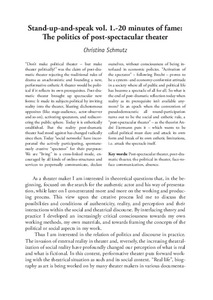Stand-up-and-speak vol. 1.-20 minutes of fame: The politics of post-spectacular theater

Ver/descargar
Metadatos
Mostrar el registro completo del ítem
Estudis escènics: quaderns de l'Institut del Teatre. 2015, Núm. 41-42
Tipo de documentoArtículo
Resumen
“Don’t make political theater – but make theater politically!” was the claim of post-dramatic theater rejecting the traditional rules of drama as anachronistic and founding a new, performative esthetic A theater would be political if it reflects its own prerequisites. Post-dramatic theater brought up spectacular new forms: It made its subjects political by inviting reality into the theater, blasting dichotomous opposites (like stage-audience, actor-observer and so on), activating spectators, and rediscovering the public sphere. Today it is esthetically established. But the reality post-dramatic theater had stood against has changed radically since then. Today “social networks” have incorporated the actively participating, spontaneously creative “spectator” for their purposes: We are “living” in a cross-linked mode, encouraged by all kinds of online-structures and services to perpetually communicate, declare ourselves, without consciousness of being interlaced in economic policies. “Activation of the spectator” – following Brecht – proves to be a system- and economy-conformist attitude in a society where all of public and political life has become a spectacle of all for all. So what is the end of post-dramatic reflection today when reality as its prerequisite isn’t available anymore? In an epoch when the convention of pseudodemocratic all round-participation turns out to be the social and esthetic rule, a “post-spectacular theater” – as the theorist André Eiermann puts it – which wants to be called political must dare and attack its own form and break of its own esthetic limitations, i.e. attack the spectacle itself.
Condiciones de accesoAcceso abierto
Palabras clavePost-spectacular theater, post-dramatic theater, the political in theater, face-toface communication, absence
ISSN2385-362X
,
0212-3819

